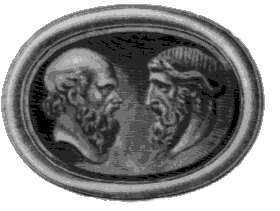Plato
The Republic
“The story of Er”
Socrates claims he's answered the original challenge (to show why justice is worthwhile for its own sake) - and shown justice to be preferable under all imaginable conditions.
The rewards of justice in this life - and/or after it!
Socrates, despite banishing the poets, proceeds to tell a poetic myth, to suggest that the soul (or personality, see Part 5) is immortal, and is rewarded after death - as he claims is "proved" by the strange tale of Er. Er was a man who was thought to have died on the battlefield - but after his soul had been to the Underworld and seen the rewards and punishments dealt out to the good and the bad he was revived - and could tell the tale.
We aren't expected to believe this as history - it's rather Plato's attempt to persuade us by poetic means (!) to the truth which he's tried to prove by logical means in the rest of the book.

The Warner Brothers film The Matrix (1999) is a modern reworking of Platos's Cave. Read the essay by John Partidge?
This ends our quick tour of the Republic. Return to the start? ![[Next Page?]](next.gif)

